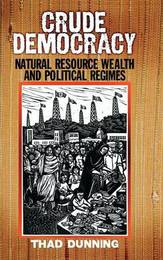
|
Crude Democracy: Natural Resource Wealth and Political Regimes
Hardback
Main Details
| Title |
Crude Democracy: Natural Resource Wealth and Political Regimes
|
| Authors and Contributors |
By (author) Thad Dunning
|
| Series | Cambridge Studies in Comparative Politics |
|---|
| Physical Properties |
| Format:Hardback | | Pages:350 | | Dimensions(mm): Height 229,Width 152 |
|
| ISBN/Barcode |
9780521515009
|
| Classifications | Dewey:321.8 |
|---|
| Audience | | Professional & Vocational | |
|---|
| Illustrations |
7 Tables, unspecified
|
|
Publishing Details |
| Publisher |
Cambridge University Press
|
| Imprint |
Cambridge University Press
|
| Publication Date |
8 September 2008 |
| Publication Country |
United Kingdom
|
Description
This book challenges the conventional wisdom that natural resource wealth promotes autocracy. Oil and other forms of mineral wealth can promote both authoritarianism and democracy, the book argues, but they do so through different mechanisms; an understanding of these different mechanisms can help elucidate when either the authoritarian or democratic effects of resource wealth will be relatively strong. Exploiting game-theoretic tools and statistical modeling as well as detailed country case studies and drawing on fieldwork in Latin America and Africa, this book builds and tests a theory that explains political variation across resource-rich states. It will be read by scholars studying the political effects of natural resource wealth in many regions, as well as by those interested in the emergence and persistence of democratic regimes.
Author Biography
Thad Dunning is Assistant Professor of Political Science at Yale University and a Research Fellow at Yale's Whitney and Betty MacMillan Center for International and Area Studies. Dunning's previous work has appeared in International Organization, The Journal of Conflict Resolution, Political Analysis, Studies in Comparative International Development, and other journals. His research interests lie in comparative politics, political economy, and international relations.
Reviews"Thad Dunning has produced an outstanding book, founded on a theoretically-sophisticated re-evaluation of the popular and academic consensus linking oil and resource wealth to political authoritarianism. By showing - both in game theoretic and empirical terms - how resource wealth can promote both democracy and authoritarianism, albeit through separate mechanisms, Dunning provides the first account that simultaneously explains the well-known cases of oil-based authoritarianism as well as the oft-overlooked resource-rich democracies. It is an analytical tour-de-force that will likely set the bar for future studies of resource politics, and through its innovative marriage of formal, statistical, and qualitative tools, for comparative politics more generally." -Marcus Kurtz, Ohio State University "Is oil good or bad for democracy? Read this book and find out why the wrangling is over. Social science meets comparative politics, at last." -James Robinson, Harvard University "This innovative book brings a new level of sophistication to the study of resource wealth and democracy. Dunning makes a compelling argument - using case studies, statistical analysis, and formal models - that resource dependence will have sharply different effects on governance, depending on a country's prior level of inequality: where inequality is low, oil dependence may hinder democracy, but where it is high, oil dependence may foster democracy. This is a wonderfully nuanced analysis that will have a major impact on the field, and should be widely read." -Michael Ross, University of California, Los Angeles "Crude Democracy shatters the widely-held view that natural resource wealth breeds authoritarianism. With a potent blend of in-depth fieldwork, formal models, statistical analysis, and small-N comparisons, Dunning carefully elucidates the contrasting political consequences of natural resources, showing that they can surprisingly have a democracy-promoting effect. The result is a work of first-class scholarship that anyone interested in development and democracy needs to read." -Richard Snyder, Brown University
|